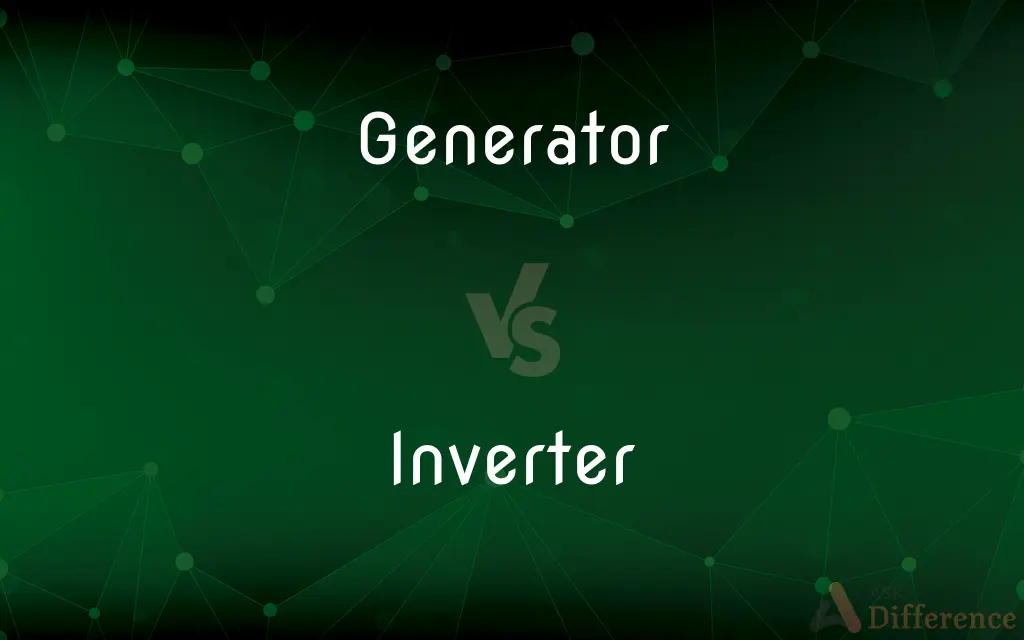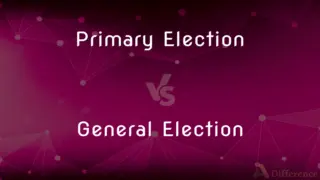Generator vs. Inverter — What's the Difference?
By Tayyaba Rehman & Urooj Arif — Published on April 3, 2024
Generators convert mechanical energy to electrical energy, ideal for high-power needs; inverters convert DC to AC power, offering cleaner energy for sensitive electronics.

Difference Between Generator and Inverter
Table of Contents
ADVERTISEMENT
Key Differences
Generators produce electrical power through the conversion of mechanical energy, usually derived from internal combustion engines using fuels like gasoline, diesel, or natural gas. Inverters, on the other hand, are electronic devices that convert direct current (DC) from sources like batteries, solar panels, or fuel cells into alternating current (AC), the type of electricity used in homes and businesses. Inverters provide a stable and consistent power supply, which is crucial for sensitive electronic devices such as computers, medical equipment, and televisions.
Generators can be noisy and emit pollutants due to the combustion process. They are well-suited for providing high levels of power, making them ideal for applications ranging from residential emergency power supplies to industrial and construction sites. Inverters, on the other hand, are typically more energy-efficient and quieter than generators, but their power output is generally lower, making them suitable for smaller scale applications.
The choice between a generator and an inverter depends on the specific power needs, the sensitivity of the equipment being powered, and considerations such as portability, noise, and fuel efficiency. Generators are preferred for their ability to generate large amounts of power for extended periods, while inverters are favored for their clean, stable power output, especially in applications where power quality is critical.
While some devices combine both technologies—known as inverter generators—to offer the benefits of both (portable power generation with cleaner, more stable output), the fundamental differences in operation and application between traditional generators and inverters remain significant.
Comparison Chart
Power Source
Mechanical energy (usually from an internal combustion engine)
Direct current (DC) from batteries, solar panels, etc.
ADVERTISEMENT
Power Output
High (suitable for large appliances and industrial use)
Lower (ideal for sensitive electronics)
Energy Conversion
Converts mechanical energy to electrical energy (AC)
Converts DC to AC
Noise Level
Generally higher due to the combustion engine
Quieter, as they involve no moving mechanical parts
Efficiency
Less efficient, more fuel consumption
More efficient, less energy loss
Portability
Larger and heavier, but portable models exist
Typically more compact and lightweight
Use Case
Emergency power supply, construction sites, large events
Recreational vehicles, home backup for critical devices, portable electronics
Compare with Definitions
Generator
A machine that converts mechanical energy into electrical energy, typically using an internal combustion engine.
The construction site used a diesel generator to power equipment.
Inverter
An electronic device that converts DC into AC, enabling the use of household appliances and sensitive electronics from batteries or solar panels.
The solar panels charged the batteries, and the inverter supplied power to the home.
Generator
Designed to provide substantial power output, making it suitable for heavy-duty applications.
During the blackout, the hospital relied on its generator to maintain operations.
Inverter
Often used in portable applications due to their light weight and efficiency.
The RV's inverter allowed for the use of AC appliances while off-grid.
Generator
Available in various sizes, from portable units to large industrial models.
He bought a small portable generator for camping trips.
Inverter
Provides cleaner, more stable power, protecting devices from power surges and fluctuations.
The inverter ensured that the sensitive laboratory equipment operated safely.
Generator
Can be noisy and require regular maintenance due to the mechanical components and fuel combustion.
The event organizers placed the generator away from guests to minimize noise.
Inverter
The efficiency and quiet operation make inverters ideal for residential and recreational use.
For the outdoor movie night, they used an inverter to power the projector quietly.
Generator
Fuel types can include gasoline, diesel, or natural gas, affecting the generator's portability and running costs.
The backup generator at the office building ran on natural gas for efficiency.
Inverter
Can be integrated into renewable energy systems, enhancing the usability of solar or wind power.
The off-grid cabin's inverter converted solar panel output into usable electricity.
Generator
One that generates, especially a machine that converts mechanical energy into electrical energy.
Inverter
A device used to convert direct current into alternating current.
Generator
An apparatus that generates vapor or gas.
Inverter
An electronic device whose output reverses the sign of its input current or voltage, thereby shifting the phase of alternating current signals by 180 degrees. Also called phase inverter.
Generator
A circuit that generates a specified waveform.
Inverter
(electrical engineering) A power inverter.
Generator
Any machine that transforms mechanical into electrical energy; a dynamo.
Inverter
An electrical converter that converts direct current into alternating current
Generator
Engine that converts mechanical energy into electrical energy by electromagnetic induction
Generator
An electronic device for producing a signal voltage
Common Curiosities
How do I choose between a generator and an inverter?
Consider your power needs, the sensitivity of your devices, noise tolerance, and fuel efficiency. For smaller, sensitive electronics, choose an inverter; for larger power needs, a generator.
Which is better for home use, a generator or an inverter?
It depends on the specific needs; inverters are better for smaller, sensitive electronics, while generators are suited for higher power demands.
Can an inverter replace a generator?
For certain applications requiring clean, stable power for sensitive devices, yes. However, for large-scale power needs, a generator might be necessary.
Can I use a generator to power sensitive electronics?
While possible, it's risky due to potential power fluctuations. An inverter generator or using an inverter with a regular generator is a safer option.
What maintenance does a generator require?
Regular engine maintenance, oil changes, and fuel system checks are necessary for optimal performance.
Can I use an inverter for outdoor activities?
Absolutely, inverters are great for camping, RVs, and boating, providing AC power for various devices.
Is it safe to run a generator indoors?
No, due to the risk of carbon monoxide poisoning, generators should only be operated outdoors in well-ventilated areas.
Do inverters work during a power outage?
Yes, if they are connected to a charged battery or other DC power source.
Are inverters more energy-efficient than generators?
Generally, yes. Inverters convert power with less energy loss compared to the mechanical energy conversion in generators.
How long can an inverter supply power?
The duration depends on the capacity of the connected battery and the power consumption of the connected devices.
Share Your Discovery

Previous Comparison
Primary Election vs. General Election
Next Comparison
Sharara vs. GhararaAuthor Spotlight
Written by
Tayyaba RehmanTayyaba Rehman is a distinguished writer, currently serving as a primary contributor to askdifference.com. As a researcher in semantics and etymology, Tayyaba's passion for the complexity of languages and their distinctions has found a perfect home on the platform. Tayyaba delves into the intricacies of language, distinguishing between commonly confused words and phrases, thereby providing clarity for readers worldwide.
Co-written by
Urooj ArifUrooj is a skilled content writer at Ask Difference, known for her exceptional ability to simplify complex topics into engaging and informative content. With a passion for research and a flair for clear, concise writing, she consistently delivers articles that resonate with our diverse audience.













































